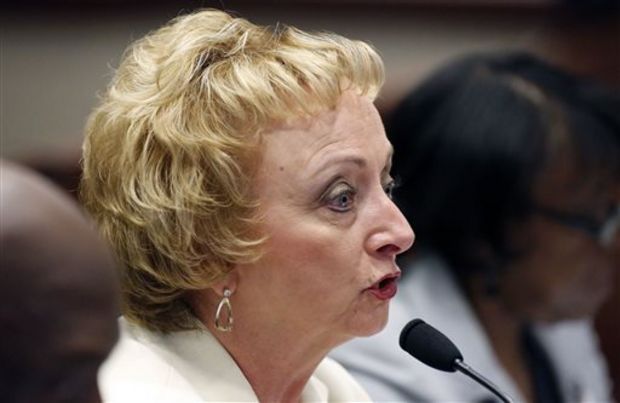

JACKSON, Mississippi (AP) — Mississippi education officials are considering as many as seven alternate paths to a high school diploma for students who fail one or more high school exit exams.
The state Board of Education agreed Oct. 18 to seek public comments. The plan has drawn questions because it could allow students to graduate without showing much proficiency in science or U.S. history.
Among alternatives would be scores from the ACT college test; Advanced Placement and International Baccalaureate exams; the test the U.S. military gives to recruits; and two routes aimed at students taking career or technical courses.
Associate State Education Superintendent Jean Massey said many other states have set up additional ways for students to graduate, and she said Mississippi should do the same.
“It’s the right thing to do for kids,” Massey said.
State officials estimate, for example, that more than 10 percent of students who fail a subject area test would be permitted to pass based on their ACT score.
Reports from the Education Commission of the States and the Center on Education Policy show Mississippi would offer more options than most states. With board approval, seniors this year could use the alternatives, state officials say. Students would still have to take all four tests, but if they failed any, the options would be available.
Since 2003, Mississippi public high school students have been required to pass four subject-area tests to graduate — algebra I, English II, biology I and U.S. history. The idea was to make sure students were learning the basics no matter where they attend school.
“That’s exactly what the subject area tests are designed to do, to say you have a certain level of competency, that your diploma means something,” said Nancy Loome, executive director of the Parents Campaign, which lobbies to support education in Mississippi. “We can’t have it both ways.”
The tests now given at the end of courses replaced an older exit exam called the Functional Literacy Exam, which had been given since the 1980s. Last year, 90 percent of Mississippi’s 28,400 seniors passed all four tests on their first try. By the state’s count, 2,807 seniors lacked a passing score on one or more tests.
Not all of those actually failed. Some are transfers from private schools or other states and aren’t required to pass tests for classes they completed elsewhere. Others are special education students who aren’t required to pass the tests.
Some students who didn’t pass the tests wouldn’t have graduated anyway because they didn’t complete all required classes.
Students start taking the tests when they finish the course, sometimes as early as eighth grade for algebra I. Seniors typically get at least four chances at each test. Still, some don’t graduate because they haven’t passed. Last May, the state organized a special last-chance testing at Mississippi State University for students who needed to pass only one of four subjects.
One alternative that national experts said was unusual were options aimed at career technical students. For example, students could take the ACT Work Keys exam, which is used to measure writing and math, but also worker skills such as listening and teamwork. If they earned a silver certificate, the second-lowest of four career-ready levels, they could be eligible to graduate if they also earned an industry certification specified in state rules.
State officials say technical enrollment tends to fall because students often transfer back to their original high school from career-technical centers to complete math and English remediation, and that the alternative standards would avoid that problem.
Like on the Work Keys, some other scores are set at low levels. Students would only have to score a 16 on the corresponding ACT subject area. The top score on an ACT test is 36, and 16 is basically the floor for university admissions in Mississippi. On the Advanced Placement exams, students would only have to score a 2 on a 5-point scale, which the AP organization describes as “possibly qualified” for college credit. A student would have to score only a 2 on the International Baccalaureate exams, which that group describes as “poor.”
Another concern is that some alternates may not prove that students know anything about biology or U.S. history. The ACT test would allow students to substitute reading for history. The military recruit test and the ACT Work Keys have little science or history at all.
“So, we are lessening our requirements in science and social studies areas?” state Board of Education member Hal Gage of Vicksburg asked during an Oct. 17 work session of the board.
The push for alternatives comes as other changes are on the horizon. The math and English subject area tests are likely to be tightened as Mississippi adopts Common Core state standards and tests are written by a multistate alliance. Also, students are likely to be administered the ACT college test as part of a new school-grading system. Right now, about 15 percent of seniors graduate without taking the ACT.
JACKSON, Mississippi — Today, Mississippi students must pass tests in algebra, biology, English and U.S. history to graduate from high school. The state Board of Education is considering creating seven alternative options for students who fail one or more of the tests:
— Score 16 or higher on the ACT college test in the corresponding subject area, with reading substituted for U.S. history.
— Earn a C or higher in a credit-bearing college course in the subject area as part of a dual enrollment program between a high school and college.
— Score 2 or higher on an International Baccalaureate exam in the subject area.
— Score 2 or higher on an Advanced Placement exam in the subject area.
— Score 43 or higher on the Armed Services Vocational Aptitude Battery (ASVAB).
— Score 36 or higher on the ASVAB and either earn a passing score on a state vocational test or earn an approved industry certification.
— Earn a silver or higher certificate on the ACT Work Keys and either earn a passing score on a state vocational test or earn an approved industry certification.
Source: Mississippi Department of Education



